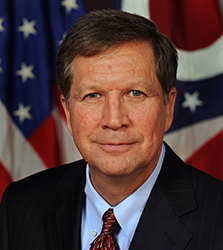
Kasich’s very, very narrow path to the nomination
Ohio Gov. John Kasich's path to the GOP nomination is, to put it mildly, among the most difficult conceived in the modern era of presidential politics. Bloomberg Politics this morning has an article describing what, if any, plausible scenario might wind up pitting Kasich against the Democratic nominee this fall:
Kasich's Nomination Strategy Is the Highest Wire Act of 2016
John Kasich has fewer delegates than Florida Senator Marco Rubio, who dropped out of the Republican presidential race a month ago. He hasn't won any state besides his own, and has placed third or worse 26 times. Donald Trump and Ted Cruz have labeled him a spoiler and have called on him to quit.
Yet the Ohio governor steadfastly insists he is the most electable candidate and has a legitimate shot to win the nomination—though not by amassing the requisite number of delegates ahead of July's convention, which is mathematically impossible even if he captured every single vote in the remaining Republican contests.
Kasich's long shot plan can work only if Trump fails to amass the 1,237 delegates needed to win the first ballot at the Republican convention in Cleveland, which is a possibility, and then if hundreds of Trump's delegates refuse to back Cruz—who has more than three times the delegates Kasich has earned so far—in successive ballots.
The article also provides some insight into what the Kasich campaign is doing to execute this high-wire act:
Kasich's strategy rests on laying the groundwork for winning a contested convention by getting loyal delegates selected in the various state meetings and winning them over. To that end, his campaign has 32 paid staff members dedicated to the delegate process working in 10 states on any given day, said Andrew Boucher, the former national political director for Rick Santorum’s 2012 presidential campaign who is helping to lead Kasich’s delegate effort.
That means five or six conference calls a day among the team, and moving staff to wherever delegates are being selected at state party meetings in a given week. New Day for America, the super-PAC supporting Kasich, also is executing a delegate strategy to help the governor in an open convention, said spokeswoman Connie Wehrkamp....
While Kasich's path to the nomination remains the longest of long-shots, the likelihood that the 2016 Republican convention will require more than one ballot means anything is possible. To cite just one example, on the first ballot of the 1880 James A. Garfield, an Ohio Congressman, received zero votes, and received only one on the second. By the 36th ballot, he was the nominee.



